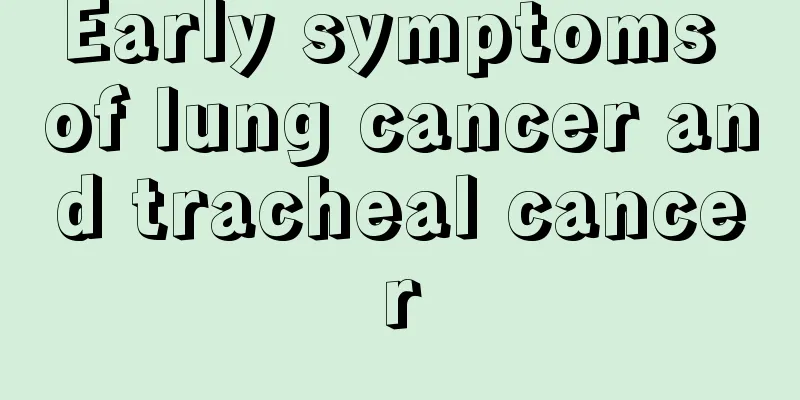Early symptoms of lung cancer and tracheal cancer

|
Early symptoms of lung cancer and tracheal cancer may include persistent cough, coughing up blood, chest pain, difficulty breathing, etc. Early detection and treatment are crucial. 1. Persistent cough Persistent cough is one of the most common early symptoms of lung cancer and tracheal cancer. This cough usually lasts for a long time and is not easy to relieve. It may be accompanied by sputum or blood. The cause of the cough may be related to the tumor irritating the tracheal or bronchial mucosa. If the cough persists for more than two weeks, especially with blood, it is recommended to see a doctor as soon as possible and undergo a chest CT or bronchoscopy. 2. Coughing up blood Coughing up blood is an important warning sign of lung cancer and tracheal cancer. Tumor growth may cause blood vessels to rupture, and blood may be excreted mixed with sputum. The amount of blood coughed up may vary from a small amount of blood to a large amount of fresh blood. Once symptoms of coughing up blood occur, you should see a doctor immediately to determine the cause. The doctor may recommend bronchoscopy or imaging tests to determine the location and nature of the lesion. 3. Chest pain Chest pain is one of the common symptoms of lung cancer and tracheal cancer, usually manifested as persistent dull pain or stabbing pain. The pain may be related to the invasion of the chest wall, nerves or pleura by the tumor. If the chest pain is accompanied by coughing or difficulty breathing, be alert to the possibility of lung cancer. The doctor may further evaluate the condition through chest X-ray, CT or PET-CT examination. 4. Difficulty breathing Shortness of breath is a late symptom of lung and tracheal cancer, but it may occur in the early stages. The tumor may block the airway, resulting in airflow restriction and shortness of breath. If you have unexplained shortness of breath, especially if it is accompanied by other symptoms such as cough or chest pain, you should see a doctor promptly. Your doctor may recommend lung function tests or a bronchoscopy. 5. Hoarseness Hoarseness may be one of the early signs of lung cancer or tracheal cancer. The tumor may compress the recurrent laryngeal nerve, causing abnormal vocal cord function. If hoarseness persists for more than two weeks without an obvious cause, be alert to the possibility of lung cancer. Your doctor may recommend a laryngoscopy or imaging test. 6. Weight loss and fatigue Unexplained weight loss and fatigue may be systemic manifestations of lung and tracheal cancer. Tumor growth consumes a lot of energy and may affect appetite and nutrient absorption. If you lose a lot of weight in a short period of time and are accompanied by other symptoms, you should see a doctor immediately. Your doctor may recommend blood tests or imaging tests. The early symptoms of lung cancer and tracheal cancer may not be obvious, but if you have persistent cough, coughing up blood, chest pain, dyspnea and other symptoms, you should seek medical attention as soon as possible. Early diagnosis and treatment are the key to improving survival rates. Through chest CT, bronchoscopy and other means, you can make a clear diagnosis and develop a personalized treatment plan. |
>>: What causes cervical cancer and what are its typical symptoms
Recommend
Is vomiting blood in late stage liver cancer contagious?
Vomiting blood in the late stage of liver cancer ...
Will anti-inflammatory drugs cause redness and hotness in the face?
People with sensitive skin are more prone to alle...
Chin allergy causes rash
Allergies are very common and rashes will appear ...
What to do if athlete's foot causes peeling and sore feet
The incidence of athlete's foot is relatively...
Can Poria cocos remove acne?
Poria cocos is a common Chinese medicinal materia...
Patients with advanced lung cancer should not drink alcohol
The patient is a 45-year-old male with advanced l...
What's wrong with the itchy palate in my throat
The weather nowadays is hot and cold, which can e...
Who can't use a foot bath?
Nowadays, more and more friends are using foot ba...
Liver cancer warning signs: If these 3 abnormalities appear in the head, doctors remind you to be highly vigilant!
The liver is known as the "silent organ"...
How to treat recurrence of liver cancer after liver transplantation
If liver cancer recurs after liver transplantatio...
How to wash off dried milk tea stains
Milk tea stains are water-soluble stains. If they...
How to make hair grow fast, what method to use
Hair growth is closely related to the nutritional...
Highly malignant brain cancer - medulloblastoma
Medulloblastoma is a highly malignant brain cance...
Is a sad and weak look hereditary?
Neurasthenia is a very common disease, which is a...
Cell proliferation is caused by inflammation
Cell proliferation is a very common disease. Cell...









